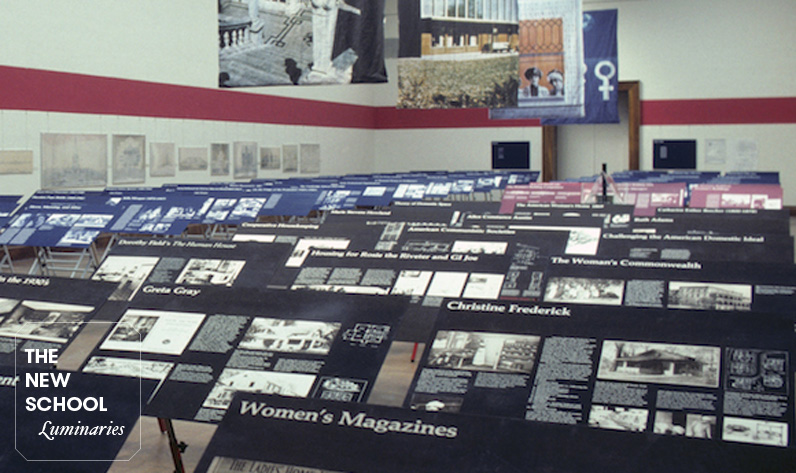
Susana Torre on Women In Architecture

A detail of the 1977 exhibition Women in American Architecture: A Historic and Contemporary Perspective, curated in part by Susana Torre, who speaks at Parsons on March 18.
On March 18, Parsons The New School for Design will host architect Susana Torre, who will deliver the keynote address at the Feminism and Architecture: Intergenerational Conversations panel discussion. A revolutionary figure in architecture, Torre has fought for the recognition of women in the field, promoting their work and advocating for a feminist architectural perspective. At Parsons in the early 1990s, Torre also helped establish the Master of Architecture program, which is now part of Parsons’ School of Constructed Environments.
Torre came to America from Argentina to study in the mid-1970s. She was working at the State University of New York, a few hours outside of Manhattan, when she was invited to join a group of female architects convened by the architect Reggie Goldberg. The group, originally interested in supporting research on female architects, developed into The Architectural League of New York’s Archive of Women in Architecture.
In 1977, Torre and her colleagues organized an exhibition called Women in American Architecture: A Historical and Contemporary Exhibition. The show, which led to the publication of a book of the same name in 1978, was an immediate success. The New York Times architecture critic Ada Louise Huxtable described it as “a first-rate history and a most unsettling picture of women’s architectural achievements.” Unsettling was the fact that the show exposed the limited sphere in which female architects work. As Huxtable put it, “All those bloody houses!”
“We did not focus on the ‘exceptional’ women,” Torre told The Architectural League of New York in a recent interview. “Doing so would have encouraged the view of inscribing women into the history of architecture only one at a time, according to the values of the dominant culture…We showed them in the context of the work of the common practitioner, because for the common female practitioner throughout the past century, designing a whole house was a major achievement.“
In her talk at Parsons, Torre will discuss what has—and has not—changed in terms of gender inequality in the architecture profession since the time of her 1977 exhibition. Now, as then, a relatively small percentage of working architects are women. Although roughly 40 percent of architecture students today are female, only 23 percent of working architects are women, and a mere 17 percent of partners and principals of firms are female.
Rather than simply focusing on the numbers of women working in architecture, however, Torre hopes to spark a wider consideration of feminist perspectives in architecture. “A feminist point of view demands equal opportunity for all the members of a disadvantaged group, not only women,” she told the NEW_S via email. “It also promotes an acknowledgement of diversity and difference, which is a hallmark of our society.” Gender-based discrimination is particularly acute in architecture, Torre believes. “Unlike design professions like fashion, graphic, or product design, which were developed in the mid-20th century, architecture has a centuries-long history of excluding women—which has been more difficult to overcome. In the past, young women of taste and means were steered toward interior decoration instead of architecture. Fortunately, interior design has finally become a profession that is no longer stereotyped,” said Torre.
Academic institutions have a critical role to play in the process of advancing feminist perspectives, Torre said. “In relation to architecture, the university is the best place for women to develop peer recognition. Such recognition, although necessary for both men’s and women’s professional success, has been more elusive for women after they graduate.“
Torre speaks as part of Feminism and Architecture: Intergenerational Conversations, which will be held on Tuesday, March 18, at 6:00 p.m. in the Theresa Lang Community and Student Center, Arnhold Hall, 55 West 13th Street.